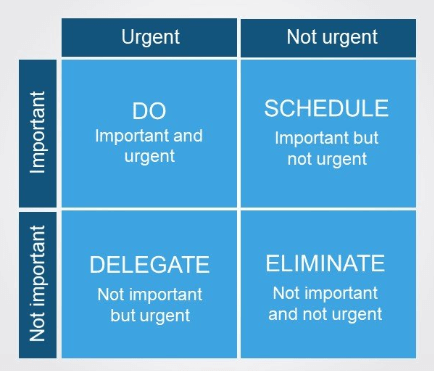With just 24 hours a day, do you often find yourself asking: how to manage your time and prioritise tasks? Managing time effectively starts with how you deal with situations to keep yourself on track to meeting clear goals. Smartly prioritising your tasks is an important step towards managing time effectively.
We’re living in a world where the open secrets to how to manage your time and prioritise tasks effectively are increasingly lost every day. Multitasking is the new norm, and it seems that humans currently have even shorter attention spans than goldfishes. Effective time management and task prioritisation is so important, how well your manage your time and tasks directly affects how successful you are at school and likely even in life.
Curious to know how to manage your time and prioritise tasks effectively? Read on to find out.
How to manage your time and prioritise tasks in 5 steps
Step 1: Categorise your tasks first.
If you are one of many who struggle to manage time effectively and desperately asking how to manage your time and prioritise tasks, you need to first understand how to take apart heavy workloads first.
Not every task you have on hand demands your attention immediately, nor are all tasks equally important in their outcomes. Assign your tasks accordingly using what is called as the Eisenhower Matrix.

In the Eisenhower Matrix, all your tasks are prioritised according to importance and urgency. This is great because you only really need to focus on tasks that are both important and urgent. For tasks that are either or or neither nor, simply do it later, get someone to do it for you, or ignore it completely.
Step 2: Learn to say No.

A big reason why so many of us feel so cluttered and pressed for time is because we as human beings naturally feel a need to be socially obliging. But when we over-accommodate and take on more than we should, that’s when we lose focus on productivity takes a big hit.
But it’s not just about saying no to others. It’s also about saying no to ourselves. For the detail-oriented perfectionists out there, this particularly applies to you. Perfectionists are known to be notorious procrastinators, but instead of dilly-dallying and stressing over making the perfect decision, just go ahead with the flow.
In a sense, knowing how to manage time effectively is also about knowing how to always stay in control. When you say no to things that do not matter or stress you excessively, it’s easier to manage your tasks and ensure you’re in peak productivity.
Step 3: Always decide on your most important task first.
After you have categorised your tasks and stopped piling on your list of to-dos, it’s time to get down to the daily nitty-gritty of planning productive work days every day. A key solution for how to manage your time and prioritise tasks is to always work on and complete your most important task of the day first.
Many productivity experts swear by this technique, and it’s easy to see why. By designating one task as your most important task you should do first thing every morning, you narrow down your focus and build up discipline to make sure your focus stays sharp after prolonged periods.
Step 4: Be flexible and switch tasks when you hit a roadblock.
Another power tip for how to manage your time and prioritise tasks is to adapt to circumstances and focus on another task if and when the situation demands it.
We somehow believe that all work has some sort of intrinsic value, and that makes us very susceptible to what’s known as the “sunk cost fallacy”. Basically, we feel pressured to continue working on something just because so much time and energy has already been invested in it.
This can easily translate into chasing personal goals or business projects that may be increasingly unviable or unprofitable just because we believe that our efforts must necessarily translate to some sort of productive outcome.
Do not work on the wrong priorities. Any time spent continuing to work on them is just wasted time.
Step 5: Keep a clear separation between work and personal life
With more of us entering the gig economy and remote working a growing trend, the line between work and personal life is increasingly blurred. This doesn’t mean we shouldn’t make an effort to keep our personal space free from work though.
Separating work from personal life is important not only for time management but also mental health. A strong work-life balance reduces work stress and prevents potential burnout, which in turn is important for managing your time and prioritising your tasks effectively.
There are lots of tried-and-tested ways to separate work from personal life – keeping a schedule and having a separate phone or phone number for work, for example, are two really great solutions.
Manage your time and prioritise tasks more effectively with Phoner.
Having a separate phone number for work ensure your actual phone number is meant solely for your personal life. Want to peacefully enjoy your weekends or holidays without a intrusive work all? A separate phone number is all you need.
Here’s where Phoner comes in.

With Phoner, you have access to unlimited phone numbers from around the world you can use immediately without having to get a new phone or SIM card. Phoner’s second phone numbers reliably receive calls and messages, so you can silently keep in touch with office colleagues while enjoying your downtime.
So that was our quick look at how to manage your time and prioritise tasks. Get Phoner now and manage your time more effectively today!
